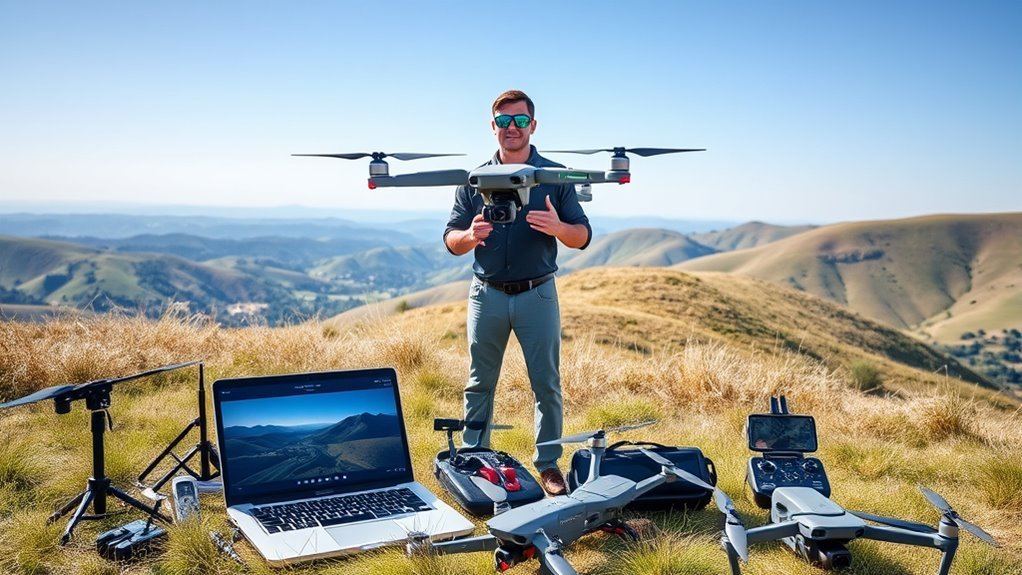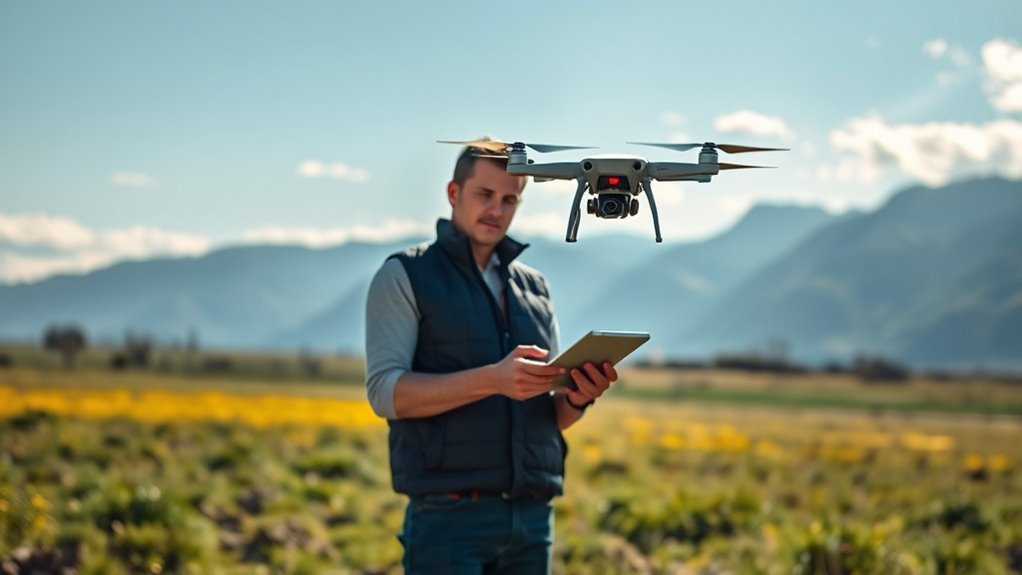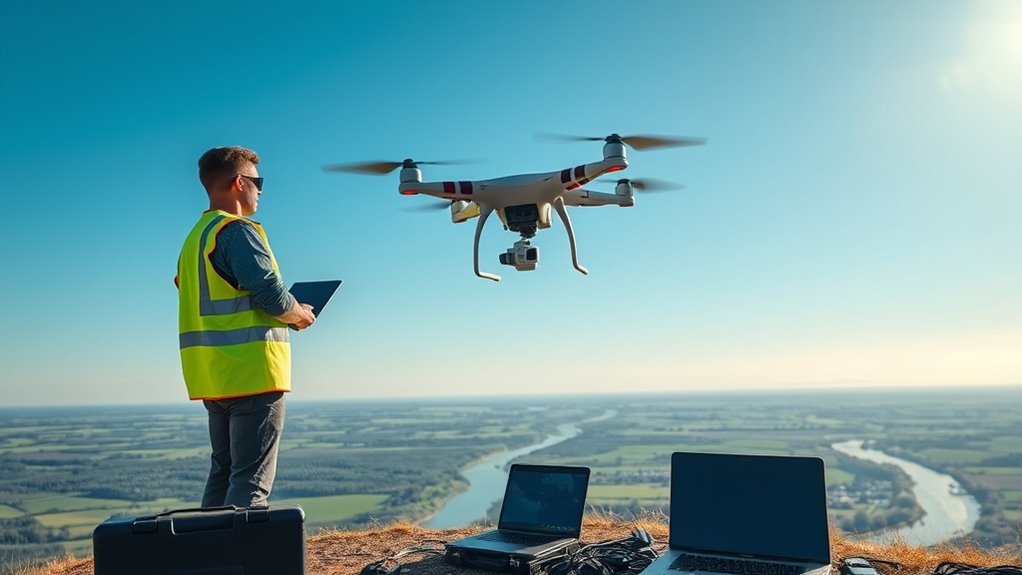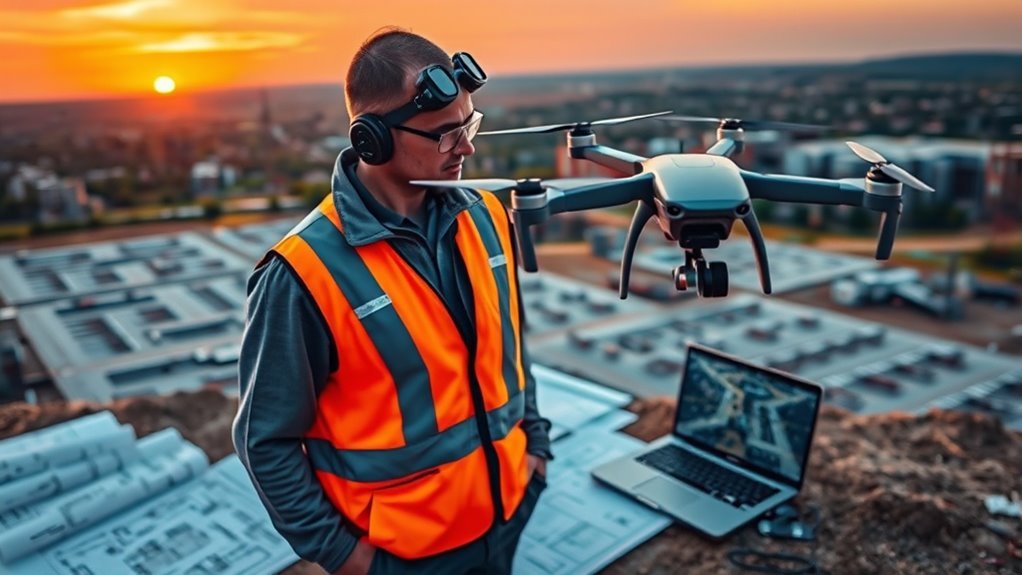As a drone pilot in today’s job market, you’re tasked with managing drone operations, ensuring safety compliance, and conducting aerial assessments across various sectors like agriculture, infrastructure, and photography. You operate advanced technology to gather and analyze data, requiring technical proficiency in flight dynamics and mapping applications. With a projected 51% employment growth by 2028, understanding industry trends and required certifications is essential for your career. Explore further to uncover more about the important skills and opportunities in this evolving field.
The Role of a Drone Pilot: An Overview

The role of a drone pilot encompasses a range of technical and operational responsibilities that are fundamental in various industries. You’re tasked with managing drone operations, which include pre-flight inspections, flight planning, and post-flight data analysis. Your pilot responsibilities require you to maintain compliance with aviation regulations and guarantee safety protocols are followed meticulously. You’ll need to possess strong technical skills to operate sophisticated drone technology, interpret aerial data, and troubleshoot equipment issues. Additionally, effective communication with team members and clients is essential to align objectives and deliver results. As you navigate this evolving landscape, your ability to adapt and innovate will be significant in maximizing the impact of drone operations while maintaining the freedom and flexibility that this role offers. Furthermore, understanding encryption and security features is crucial for safeguarding sensitive data during missions. The integration of AI-driven analytics can further enhance operational efficiency and decision-making in drone operations.
Industries That Benefit From Drone Technology

Various sectors are increasingly leveraging drone technology to enhance operational efficiency, improve data collection, and reduce costs. In agriculture technology, drones optimize crop monitoring and irrigation management. Environmental monitoring utilizes drones for precise data on ecosystems and climate change. Aerial photography revolutionizes real estate marketing, capturing properties from unique perspectives. Infrastructure inspection benefits from drones, providing detailed assessments of hard-to-reach areas safely. In disaster response, drones facilitate rapid situational awareness, aiding search and rescue missions. Wildlife conservation employs drones for tracking animal populations without disturbing their habitats. Film production relies on aerial shots that enrich storytelling. Additionally, construction surveying utilizes drones for accurate site measurements, streamlining project management. These industries exemplify how drone technology fosters innovation and efficiency, showcasing the impact of custom drones in addressing niche needs across various applications. The integration of advanced avoidance systems in drone technology enhances safety and operational reliability across these sectors.
Essential Skills for Aspiring Drone Pilots

Mastering the art of drone piloting requires a blend of technical knowledge and practical skills that are essential in maneuvering the complexities of this emerging field. To excel, you need technical proficiency in understanding drone mechanics, software, and flight dynamics. Familiarity with mapping applications and data analysis tools is vital, especially for industries like surveying and agriculture. Furthermore, if you’re interested in aerial photography, you’ll need to hone your skills in composition and lighting to capture stunning visuals. Proficiency in post-processing techniques will enhance your final product. Additionally, understanding advanced GPS systems can significantly improve your flying skills and enhance safety during operations. Finally, developing strong situational awareness and problem-solving abilities will keep you agile in unpredictable environments, allowing you to adapt and thrive as a drone pilot in today’s dynamic job market.
Certification and Training Requirements
To operate as a drone pilot, you must navigate the FAA certification process, which includes passing the Part 107 exam. You’ll also need to complete specific training programs that cover essential safety protocols and regulations governing drone operations. Understanding these requirements is vital for ensuring compliance and enhancing your employability in the competitive job market.
FAA Certification Process
The FAA certification process is a critical step for anyone looking to operate drones commercially in the United States. To gain your Part 107 certification, you must pass the FAA’s Aeronautical Knowledge Test, which assesses your understanding of airspace, regulations, and safety procedures. While the FAA certification advantages include enhanced credibility and access to a broader range of job opportunities, you’ll face FAA certification challenges, such as the need for thorough preparation and traversing complex regulations. Additionally, maintaining your certification requires staying updated on evolving rules, which can be demanding. By successfully completing this process, you not only demonstrate your skills but also reveal the potential for greater freedom in the burgeoning drone industry.
Required Training Programs
While obtaining FAA certification is essential, selecting the right training program is equally important for aspiring drone pilots. You should seek programs that cover not just the fundamentals of drone technology but also advanced piloting techniques and aerial photography. Look for accredited schools or online courses that offer thorough pilot training, including hands-on experience with various drone models. Some programs may also provide simulations to enhance your skills. Additionally, consider courses that explore industry-specific applications, such as surveying or cinematography. This targeted approach will equip you with the versatility needed in today’s job market. Ultimately, the right training program will empower you to navigate the skies with confidence and creativity, ensuring you’re ready for any challenge.
Safety and Regulations
Given that safety is paramount in drone operations, understanding the regulations and certification requirements is essential for any aspiring pilot. You’ll need to familiarize yourself with safety protocols set by aviation authorities, including the FAA in the United States. Obtaining a Part 107 certification is often a prerequisite, ensuring you’re knowledgeable about airspace classifications, operational limitations, and emergency procedures. Training programs focus on both technical skills and regulatory compliance to prepare you for real-world scenarios. Additionally, staying updated on evolving laws and guidelines is vital, as drone regulations can change rapidly. By adhering to these standards, you not only enhance your credibility as a pilot but also contribute to a safer and more responsible drone industry.
Career Opportunities and Growth Potential
As a drone pilot, you’ll find career opportunities across various industries such as agriculture, construction, and film. The increasing demand for specialized skills in aerial data collection and analysis positions you for significant growth in this evolving field. Staying updated with technological advancements will enhance your marketability and open doors for advanced roles. For instance, understanding crop geofencing and spraying safety can significantly improve your effectiveness in agricultural applications. Additionally, skills in real-time soil assessment can greatly enhance your ability to provide valuable insights in precision agriculture.
Diverse Industry Applications
In recent years, there’s been a significant surge in the demand for drone pilots across various industries, highlighting the diverse career opportunities and growth potential within this field. You can explore roles in agricultural monitoring, where drones enhance crop health evaluations, or get involved in aerial photography for stunning visual content in real estate marketing. Infrastructure inspection is another critical area, enabling quick reviews of structures like bridges and power lines. Additionally, your skills can support emergency services and disaster response teams in evaluating damage or locating victims. Environmental conservation efforts benefit from wildlife tracking and habitat monitoring, showcasing how versatile your role can be. Embracing these applications not only provides job stability but also contributes meaningfully to society.
Increasing Demand for Skills
While the demand for drone pilots continues to rise, it is vital to recognize that this growth translates into a pressing need for specialized skills and certifications. As you navigate the evolving landscape of emerging technologies, understanding market trends is essential. Proficiency in data analysis, aerial photography, and remote sensing can markedly enhance your employability. Additionally, obtaining certifications from recognized organizations can set you apart in a competitive job market. Employers are increasingly seeking individuals who can leverage drones for various applications, from agricultural monitoring to infrastructure inspections. By honing your technical skills and staying updated on industry advancements, you’ll not only secure a position but also position yourself for growth in this dynamic field. Embrace the opportunity to expand your expertise.
The Future of Drone Piloting in a Changing Landscape
The evolution of drone technology is reshaping the landscape for pilots, creating new opportunities and challenges in various sectors. As emerging technologies, such as AI and 5G, integrate with drone systems, you’ll need to adapt to market trends that demand greater precision and efficiency. The future of drone piloting isn’t just about flying; it’s about leveraging advanced analytics and automation to enhance your operations. Industries like agriculture, logistics, and surveillance are expanding, requiring specialized skills and innovative thinking. Staying ahead means embracing continuous learning and being open to new tools that increase your capabilities. As regulations evolve, you’ll find yourself maneuvering a dynamic environment, where your adaptability will define your success as a drone pilot in this changing landscape. Additionally, understanding how AI enhances flight safety will be crucial as you navigate these advancements. Furthermore, the integration of drones in real-time disease outbreak monitoring is revolutionizing public health responses and showcasing the potential for drone pilots to contribute to critical sectors.
Frequently Asked Questions
What Is the Salary Range for Drone Pilots Today?
Today’s salary range for drone pilots varies widely based on experience and industry demand. With advanced skills, you could earn between $50,000 to over $100,000 annually, reflecting the growing opportunities in sectors like agriculture and aerial photography.
Are There Part-Time Drone Pilot Positions Available?
While full-time roles exist, part-time drone pilot positions often offer greater freedom. You’ll find numerous freelance opportunities and remote work options, allowing you to balance your passion for flying with other commitments. Flexibility’s key!
How Do Weather Conditions Affect Drone Operations?
Weather conditions greatly impact drone operations. You’ll need to take into account weather limitations like wind and precipitation, making operational adjustments to guarantee safety and efficiency. Understanding these factors is essential for successful and reliable drone flight.
What Are Common Safety Regulations for Drone Pilots?
As a drone pilot, you must understand safety regulations like drone insurance requirements and airspace restrictions. Compliance guarantees not only your freedom to operate but also the safety of others in shared airspace environments.
Can I Fly Drones Commercially Without a License?
Did you know that over 70% of drone-related accidents stem from unlicensed operations? You can’t fly drones commercially without a license due to strict drone regulations, ensuring safety and professionalism in the industry.

